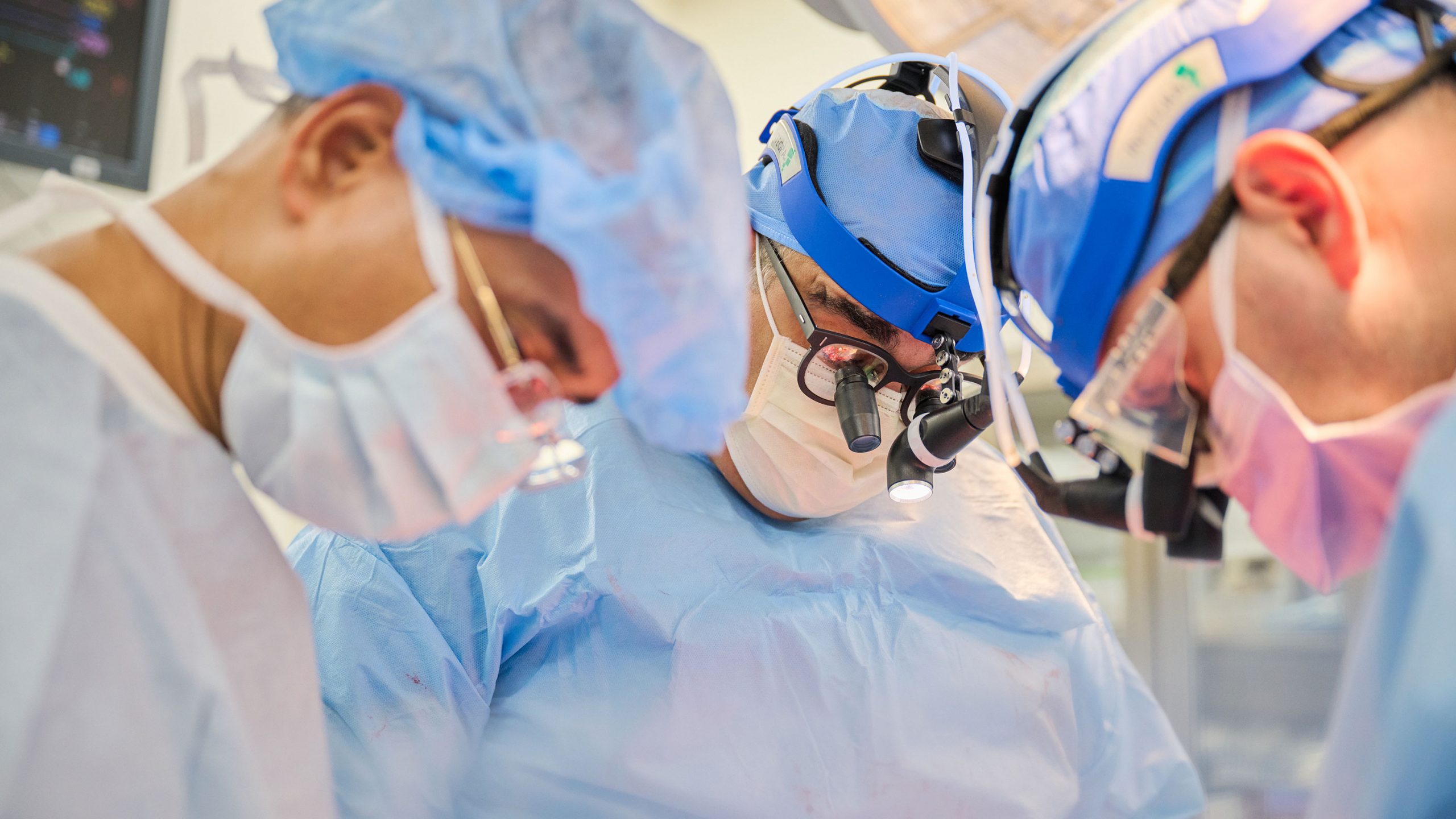Genetically modified pig heart transplanted into deceased recipient, researchers say
Jul 12, 2022, 1:31 PM

Caption: Nader Moazami, MD, (center) surgical director of heart transplantation at the NYU Langone Transplant Institute, leads the surgical team as a genetically modified pig heart is transplanted into a recently deceased donor at NYU Langone Health on Wednesday, July 6, 2022, in New York, NY. Credit: Joe Carrotta for NYU Langone Health
(center)
(CNN) — A surgical team transplanted a heart from a genetically modified pig into a deceased human as part of a research study, researchers with NYU Langone Health announced Tuesday.
The procedure was the first of its kind and represents an advance in efforts to determine whether organs in non-human animals can be modified and successfully used in humans in need of a transplant.
The 72-year-old recipient, Lawrence Kelly of Pennsylvania, had been declared brain-dead. His family donated his body for the study, which aimed to investigate how well the modified pig heart worked in a deceased human’s body.
After Kelly’s transplant in June, the research team repeated the procedure with another deceased recipient, 64-year-old Alva Capuano of New York City, in early July.
This transplants followed a procedure done by the University of Maryland in January of a pig heart into a living human. That recipient died in March.
Dr. Robert Montgomery, director of the NYU Langone Transplant Institute, said the procedures allowed for more in-depth study of how well the recipients’ bodies tolerated the pig hearts.
“We can do much more frequent monitoring and really sort of understand the biology and fill in all of the unknowns,” he said.
He added that their study was unique because they attempted to emulate real-world conditions by, for example, not using experimental devices and medications.
The researchers are working on publishing further details of the study.
‘He went out a hero’
Researchers traveled out of state to procure the heart, which had genetic modifications aimed at a number of factors, like modulating the organ’s growth and reducing the chance that the recipient’s immune system would reject it.
The flight meant the team could replicate the conditions of a typical heart transplant, said Dr. Nader Moazami, surgical director of heart transplantation at NYU Langone Health.
“It was about an hour and 15 minute flight from New York, which is typical of the distance that we take hearts for clinical transplantation,” said Moazami, who performed the transplant.
The heart went to Kelly, a Navy veteran who was declared brain-dead after a car crash. Kelly’s fiancee, Alice Michael, authorized the donation of his body to research.
“They were going to take his liver, and they couldn’t find a recipient. And then New York University called me with this research thing. And I automatically said yes, because I know he would have wanted to do it. He loved to help people,” she said.
“When they asked me, I didn’t have to think twice about it. I just automatically said yes, because I knew it was groundbreaking research, and I know he would have wanted it. It was hard because I had to wait to bury him. But in the long run, maybe he can help a lot of people.
“He was a hero in life, and he went out a hero,” Michael said.
After the transplant, the researchers conducted tests for three days to monitor how well the heart was accepted, while the recipient’s body was kept alive using machinery including ventilation.
“No signs of early rejection were observed and the heart functioned normally with standard post-transplant medications and without additional mechanical support,” the medical center said in a news release.
Additionally, the researchers said they found no signs of infection with porcine cytomegalovirus (pCMV), which experts have been concerned could pose an obstacle to using pig organs in human recipients.
A new method for transplant research
Testing how well an organ transplantation works using the donated body of a deceased person is a new method, Moazami said. The first use of this technique for research happened in September, when a team at NYU Langone led by Montgomery transplanted a kidney from a genetically modified pig into a deceased human.
Although the study represents a step forward, Moazami said, there is still work to be done before such a procedure is made broadly available outside a research setting.
“There’s still a long way to go before we go from here to clinical transplantation to support a patient in the longer term,” he said. “There’s still many, many, many questions that need to be answered.”
One important limitation was the length of the study, he said; the organ and recipient were evaluated for only 72 hours after the transplant. Additionally, there could be important differences in how deceased human bodies respond to the procedure, compared with living humans. More research will be needed to determine how transplant recipients would fare in the long term.
“We thought that in 72 hours, we could learn all the things that we would learn if we had extended this a little bit more,” Moazami said, noting that the short time frame limited the expense of the study and allowed the recipient’s body to be returned to his family quicker.
“We thought that 72 hours was a reasonable amount of period for our short-term study, to understand all the things that we needed — that three days versus five days versus seven days, wouldn’t make a difference. Would three days versus one month make a difference? Yes, absolutely. But at this stage, that would have been very, very difficult to pull off.”
Transplantation of animal organs into humans also raises an array of other ethical questions such as whether the benefits of using a modified pig heart outweigh the risks that a patient would face if they instead waited for a human organ to become available.
Personal connection and a new frontier
For Montgomery, the research has a personal side. He is a recipient of a human heart transplant, and he said the difficulty in securing a transplant is part of what motivates his work.
“During my illness, it became clear to me that this paradigm is not working. It’s a failing paradigm, and that we need a renewable resource, an alternative source of organs, that doesn’t require someone to die in order for someone else to live,” he said.
“My whole illness was all about informing me about the reality of that and changing the way I think, not that it’s not important to continue to do what we’re doing, but we’ve got to move this in a completely different direction.”
Generally, demand for organ transplantations far exceeds the supply of donor organs available in the United States. As of July 7, there are 106,074 people on the organ transplant waiting list, with 3,442 on the heart waiting list. On average, 17 people die on the organ transplant waitlist every day.
Moazami suggested that transplants from animals might someday be useful in the pediatric setting, where patients can face even greater challenges getting a human organ transplant in time. Animal organs could be used as a “bridge,” buying time before a more optimal human organ becomes available.
“Perhaps the best way to study this is maybe use it as a bridge to a human transplant, if you will, so that any patient who is in need of an organ would get this heart with the caveat that when a human heart becomes available that matches the recipient, we swap it out again,” Moazami said.
The-CNN-Wire
™ & © 2022 Cable News Network, Inc., a WarnerMedia Company. All rights reserved.













